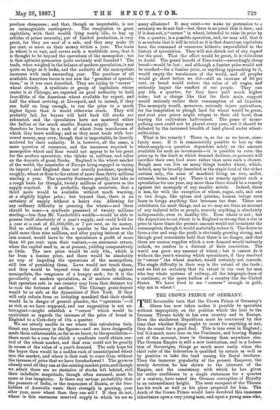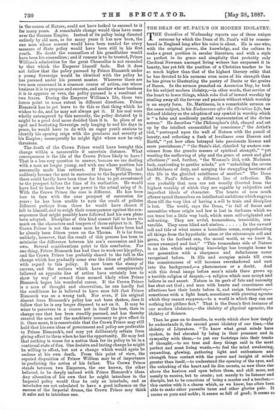THE CROWN PRINCE OF GERMANY.
THE favourable turn that the Crown Prince of Germany's illness has now taken makes it possible to speculate without impropriety on the position which the heir to the German Throne holds in hie own country and in Europe. Even the shallowest Republican must be convinced by this time that whether Kings ought to count for anything or not, they do count for a good deal. This is true even in England ; but it is much more true on the Continent, and leaving Russia out of the account, truer in Germany than anywhere else. The German Empire is still a new institution, and in a federa- tion of Sovereigns, things go much more easily when the chief ruler of the federation is qualified by nature as well as by position to take the lead among his Royal brethren. Than the immense popularity of the present Emperor, the steady devotion he has shown to the interests of the Empire, and the consistency with which he has given his entire confidence to a single statesman for a quarter of a century, have raised the German conception of Royalty to an extraordinary height. The next occupant of the Throne has his work as well as his place prepared for him. The death of the Crown Prince would have devolved this immense inheritance upon a very young man, and upon a young man who,
in the course of Nature, could not have looked to succeed to it for many years. A remarkable change would thus have come over the German Empire. Instead of its policy being directed entirely by old men, as for many years it has now been, the one man whose consent would have been needed for every measure of State policy would have been still in his first youth. No doubt the counsellors of his grandfather would have been his counsellors ; and if rumour is to be trusted, Prince William's admiration for the great Chancellor is not exceeded by that which the Emperor himself feels. But it does not follow that the policy pursued by Prince Bismarck under a young Sovereign would be identical with the policy he has pursued under his present master. Wherever there are two men concerned in a common course of action, one whose business it is to propose and execute, and another whose business it is to approve or veto, the policy pursued is a resultant of two forces. During the Emperor William's life, these two forces point to some extent in different directions. Prince Bismarck has to get leave to do this or that thing which he wishes to do, and he may not always get it. If his zeal were wholly nntempered by this necessity, the policy dictated by it might be a good deal more decided than it is. In place of an aged and hesitating Sovereign only longing to end his days in peace, he would have to do with an eager youth anxious to identify his opening reign with the greatness and security of his Empire ; consequently he might fight where now he only threatens.
The death of the Crown Prince would have brought this change within a measurable if uncertain distance. What consequences is the life of the Crown Prince likely to have ? That is a less easy question to answer, because we are dealing with a man no longer young, and with one whose position has necessarily made him reticent. If Prince William had suddenly become the next in succession to the Imperial Throne, there could hardly have been time for him to get accustomed to the prospect before the time of its realisation. He would have had to learn how to use power in the actual using of it. With the Crown Prince the case is different. He has been face to face with the near prospect of succession for years ; he has been unable to note the result of policies different perhaps from those he would have chosen if left to himself, and to weigh their consequences against the con- sequences that might possibly have followed had his own plans been adopted. Discipline of this kind cannot fail to leave its mark on the characters and tempers of those subject to it. The Crown Prince is not the same man he would have been had he already been fifteen years on the Throne. It is far from unlikely, however, that the result of this process has been to minimise the difference between his son's succession and his own. Several considerations point to this conclusion. For one thing, Prince Bismarck has had time to work out his policy, and the Crown Prince has probably shared to the full in the change which has gradually come over the ideas of politicians with regard to this policy. It now bears the stamp of success, and the nations which have most conspicuously followed an opposite line of action have certainly less to show by way of reward than seemed likely when Prince Bismarck began his wonderful career. If the Crown Prince is a man of thought and observation, he can hardly feel the confidence he is believed to have once felt that Prince Bismarck was on a wrong tack. Nor even, if his original dissent from Bismarck's policy has not been shaken, does it follow that he is any longer disposed to act on it. It may be wiser to persevere in a course not in itself the best, than to change one that has been steadily pursued, and has thereby created the men and the machinery necessary to give effect to it. Once more, it is conceivable that the Crown Prince may still hold that his own ideas of government and policy are preferable to Prince Bismarck's, and may yet deliberately refrain from giving effect to them when he has the opportunity. He may feel that nothing is worse for a nation than for its policy to be in a continual state of flux. One decisive and lasting change he might be willing to effect, but not a change which would again be undone at his own death. From this point of view, the reputed disposition of Prince William may be of importance in predicting the action of his father. The Crown Prince stands between two Emperors, the one known, the other believed, to be deeply imbued with Prince Bismarck's ideas.
Any alteration of his own that he might introduce in the Imperial policy would thus be only an interlude, and as interludes are not calculated to have a good influence on the success of the Imperial drama, the Crown Prince may think it safer not to introduce one.



































 Previous page
Previous page